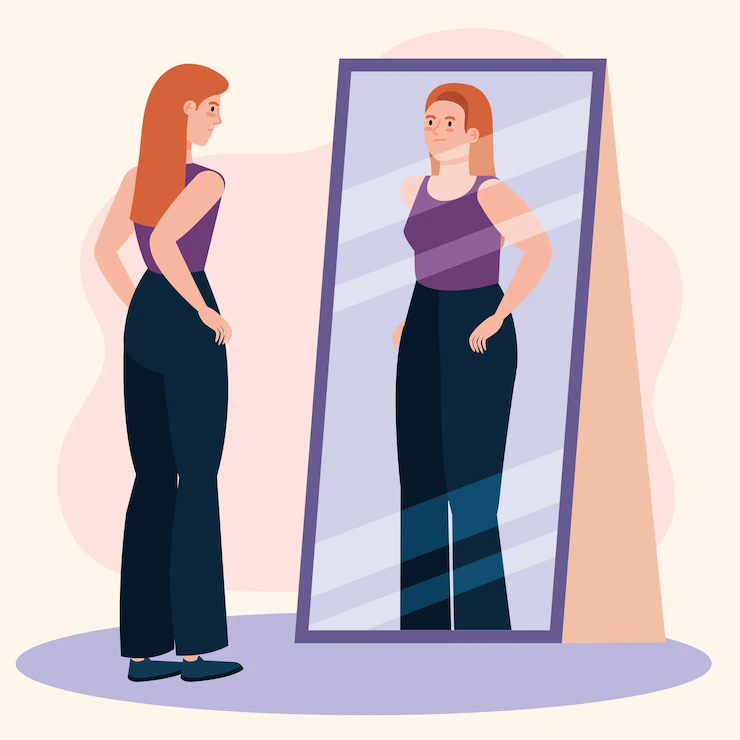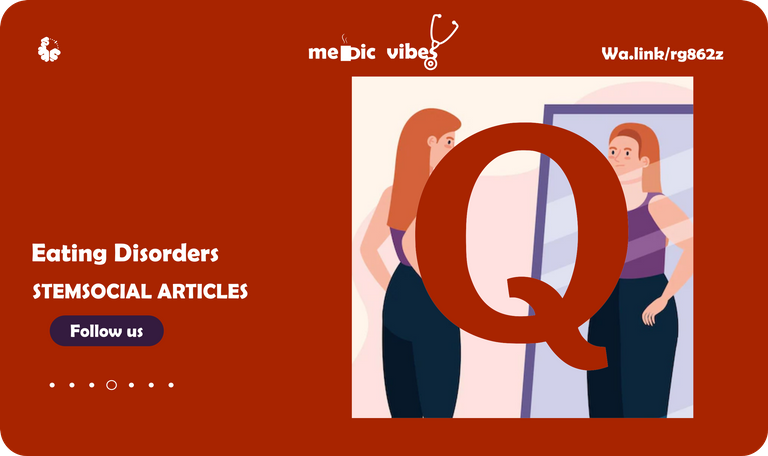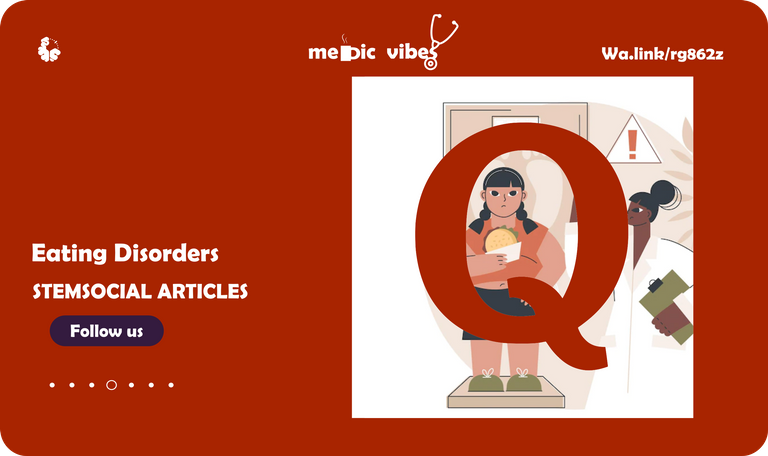In the last post, we saw how:
- Purging disorder is another type of eating disorder that is different from anorexia and bulimia.
- The first step to dealing with an eating disorder is to accept that there is a problem.
- Some habits can help a person get through an eating disorder and be better on the other side.
Is there any hope in recovering from an eating disorder?
Welcome to Medic Vibes, where we discuss mental health disorders and make sense of them. Dr Ebingo Kigigha is a medical doctor (aspiring psychiatrist) and creative person (illustration and music). This has been our routine for four consecutive months. This month will be dedicated to Eating Disorders. In the first month, we discussed Depression, and in the subsequent month, anxiety. We just finished with Schizophrenia.
In this post, we are looking at Quora. To learn more just keep scrolling down. You can also skip to the key point of the post if you which or go to the conclusion to get the summary.

Anorexia Nervosa is also called Anorexia, it is an eating disorder that is known for the low weight, the fear of gaining weight and the distortion that exists concerning weight. Those who suffer from this condition feel the need to be in control of their weight.
They have a fear of gaining weight and will put themselves in a caloric deficit so they lose weight. Some of them use restriction while others will choose to vomit or purge after eating. They may abuse drugs that will allow them to achieve this.
The main issue in anorexia is not the relationship with food. They have developed an unhealthy way to deal with emotional problems that exist and they feel more valuable because of the weight that they can maintain.
Anorexia takes control of the person's life and makes it so that their life is underneath because of this condition. Early treatment and prompt recognition is the key to the treatment of this condition.
Some of the features you can see in a person struggling with this condition are strong emotions towards body image and a deep fear of gaining weight.
Part of the reason this condition is so hard to pick out in patients is that low body eight looks differently for different people and some people may simply look thin and will not look like they are going through anything.

Eating Disorders with Poorest Prognosis(Reaction post)

Lela Black who lived with Anorexia for 5 years wrote about her experiences while the disorder bothered her day and night. It comes with the knowledge that this disorder was killing her but she was also dying inside from not complying with the demands of the disorder.
She wrote about bulimia and Anorexia because those were the two disorders she knew about. Eating Disorder had a very adverse effect on her body and cause her to be very discomforting. She suffered from heart problems and would have fainting spells and muscle spasms.
Bulimia because of the vomiting can have acidic content in the stomach attacking the teeth and gums and also the loss of electrolytes can lead to adverse effects like hypokalemia.
In anorexia, the effect is not as fast but it can take you down the same road. She explained her difficulty with refeeding and feeling bloated.
But the “voices” as explained keep pushing you to go through with the poor eating habits.
She explains that when she suffered from AN she had the thoughts of being in control and she had the mindset that she was in a safer place but she would have to deal with the anxiety of food being presented to her. She would have to come up with reasons why she didn’t want the food and then the adverse effects of starvation.
Bulimia she explains made her feel out of control and dirty inside. She would feel the need to purge or she would be affected by the adverse effects of purging like exhaustion.
Eating disorders are all catastrophic to those who suffer from them.
According to Luca Errichiello, Davide Iodice, Dario Bruzzese, Marco Gherghi who published on Research gate Anorexia has the worse outcome among the different eating disorders and has the highest mortality rates. These patients suffer from an eating disorder that makes them restrict their eating and by so doing causes them to lose weight. The deaths due to
Anorexia is mostly due to suicide and starvation. Those who recover effectively makeup about 18 to 42% of the population of those who suffer from anorexia.
In the study they discuss in their article, they tried to outline the features that make for poor outcomes in these patients.
Their study looked at 100 patients in a tertiary hospital. They checked on these patients over the phone and found that 4% of the patients were dead and 34 of these patients got better in important clinical parameters.
The features that affected the outcome were a short stay in the hospital, a shorter time for treatment and those who were self-aware. The study was also able to identify some specific types of patients who suffered from this condition.
There was a group of patients who had a BMI less than or equal to 14, no self-awareness of the condition, they had been on treatment for a long time for up to 30 days they compared them to those who had been on treatment for less than 14 days, had a BMI of more than 16 and were not taking drugs and their result where thought to be significant for clinicians.

Treatment
The goals of treatment for anorexia include:
Stabilizing weight loss.
The hardest part of treating a person who has anorexia is to have them accept that they are an eating disorder. A good number of them who suffer from this condition will go to great lengths to disagree with those who think they have an eating disorder. They typically come to the hospital for other features that are related to the eating disorder that may be sometimes life-threatening. But for the best result, as we have seen, they ought to receive treatment as early as possible.
When dealing with a patient with anorexia the first stop is to address the weight loss. It is best to start with adjustments in their weight. They may also suffer from other eating disorders separate from the primary one such as binge eating disorder, or they may have other unhealthy eating habits.
Because the main issue in eating disorders is the psychological problem it is very important they are handled. These patients usually have problems with confidence and do not see their body image through objective lenses.
There is also another comorbidity that they may experience as a result of the eating disorder such as depression, anxiety, Borderline personality disorder, obsessive-compulsive disorder and substance abuse disorders.
When they face these types of conditions they may tend to be worse off. This is why managing this condition requires a multidisciplinary treatment
Questions
- What did you learn about Eating Disorders?
Conclusion
- Anorexia is a serious medical condition that has adverse effects in every aspect of the person’s life
- Anorexia has the worse outcome among eating disorders and this is made worse when the person does not receive treatment early among other parameters.
- Anorexia requires different disciplines in medical disciplines for effective treatment.

References
- Kaplan-Sadocks-Comprehensive-Textbook-Psychiatry
- Page demarcations made with Inkscape.org
- Research gate


Thanks for your contribution to the STEMsocial community. Feel free to join us on discord to get to know the rest of us!
Please consider delegating to the @stemsocial account (85% of the curation rewards are returned).
You may also include @stemsocial as a beneficiary of the rewards of this post to get a stronger support.
The research was conducted by some scientists, published in a journal, and then uploaded to research gate. So, research gate itself cannot be the reference, but the scientist. It is preferable to dig for the source of information when making scientific claims.
The names of the authors are there on research gate, and even the DOI.
Okay. I'll edit it and add their specific names. thank you for drawing it to my attention
You are welcome